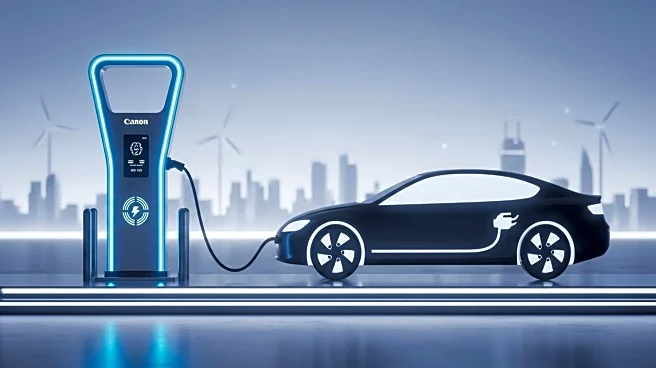What is the story about?
What's Happening?
In August 2025, global plugin vehicle registrations increased by 14% compared to the previous year, totaling over 1.7 million units. Battery electric vehicles (BEVs) saw a 23% year-over-year growth, reaching over 1.1 million units, while plugin hybrids experienced a slight decline. BEVs now represent 18% of the global auto market, with plugless hybrids accounting for 12%. The Tesla Model Y led the market with 106,000 registrations, driven by a sales rush in the U.S. before the end of a subsidy. Other notable performers include the Geely Xingyuan hatchback and Chevrolet Equinox EV, both achieving record sales.
Why It's Important?
The increase in BEV market share signifies a growing shift towards electrification in the automotive industry, driven by consumer demand and regulatory incentives. This trend is crucial for reducing carbon emissions and achieving global climate goals. The success of models like the Tesla Model Y and Geely Xingyuan highlights the competitive landscape, where innovation and affordability are key factors. The decline in plugin hybrid sales, particularly in China, suggests a potential market saturation, prompting manufacturers to focus more on BEVs.
What's Next?
As the EV market continues to expand, manufacturers are likely to invest in new technologies and infrastructure to support growth. The end of subsidies in the U.S. may lead to a temporary slowdown in sales, but long-term prospects remain strong. Companies like Tesla and Geely are expected to continue their leadership roles, while new entrants like Xiaomi and Leapmotor could disrupt the market with innovative offerings. The focus on export markets, particularly in regions like Latin America, may become a strategic priority for manufacturers facing domestic challenges.
Beyond the Headlines
The global shift towards EVs reflects broader economic and environmental trends, including the push for sustainable energy solutions and the impact of geopolitical factors on trade and manufacturing. The rise of Chinese manufacturers in the global market could influence international relations and trade policies, particularly concerning environmental standards and intellectual property rights. The evolution of consumer preferences towards electrification may also drive changes in urban planning and infrastructure development.















